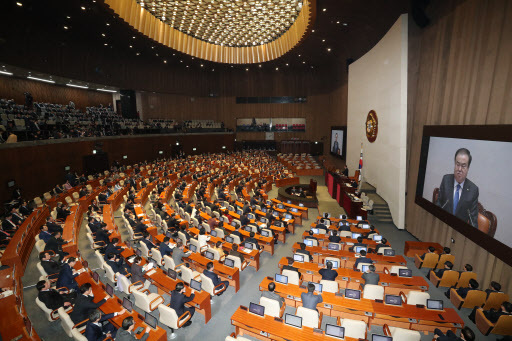National Assembly kicks off extra session after 2-month hiatus
By YonhapPublished : March 7, 2019 - 15:33
After a two-month hiatus, the National Assembly kicked off an extraordinary session Thursday to deal with contentious bills largely on the economy and electoral reform.
The 30-day session began as the main opposition Liberty Korea Party ended its boycott of parliamentary activities earlier this week.
The National Assembly has been idle since January amid tensions over a raft of allegations of government abuse of power, a controversial appointment and a former ruling party lawmaker's purchases of properties in cultural zones.

Rival parties have yet to narrow gaps on main contentious issues, but they have decided to normalize parliament amid public criticism that lawmakers turn a blind eye to people's livelihoods.
National Assembly Speaker Moon Hee-sang called for legislative efforts to resolve fine dust air pollution and pass bills on people's livelihoods as soon as possible.
"The assembly should make every effort to draw up measures to cope with fine dust that amounts to a national disaster," Moon said during his opening speech.
"The fine dust problem is the most urgent and gravest issue that affects all 50 million people. We should use every means to help the people stay healthy and live in a clean environment," he stressed.
The parties made a bipartisan agreement Wednesday that they will vote on a bill on the designation of fine dust air pollution as a national disaster next week.
In an emergency meeting, the ruling Democratic Party and two opposition parties agreed to hold a plenary session next Wednesday to pass a series of bills related to fine dust. The possibility of an extra budget is being floated as well.
Such a designation would allow the government to take extraordinary measures to respond to emergencies and compensate victims.
The legislation on fine dust is expected to be easily passed, given an urgency to tackle heath risks from the worst particulate matter the country has seen to date.
But other contentious bills, including proposals aimed at enhancing the transparency of the operation of private preschools, may face an uphill climb.
Top policymakers from the ruling DP and two opposition parties will meet later in the day to exchange a list of bills that each party wants to pass with priority and discuss the schedule for negotiations over legislation.
Electoral reform will also be a key political issue during the March session. The DP and three smaller rivals may seek to fast-track a bill on election reform.
Minor opposition parties are pushing for the introduction of a new proportional representation system for electoral reform ahead of the 2020 parliamentary elections.
But partisan negotiations have made little progress as the main opposition LKP remains lukewarm toward the reform.
The National Assembly can designate a bill that fails to get bipartisan support as a fast-track proposal if three-fifths of lawmakers approve the move. It is aimed at preventing a proposal from being pending at parliament too long. (Yonhap)







![[Graphic News] More Koreans say they plan long-distance trips this year](http://res.heraldm.com/phpwas/restmb_idxmake.php?idx=644&simg=/content/image/2024/04/17/20240417050828_0.gif&u=)
![[KH Explains] Hyundai's full hybrid edge to pay off amid slow transition to pure EVs](http://res.heraldm.com/phpwas/restmb_idxmake.php?idx=644&simg=/content/image/2024/04/18/20240418050645_0.jpg&u=20240419100350)






![[From the Scene] Monks, Buddhists hail return of remains of Buddhas](http://res.heraldm.com/phpwas/restmb_idxmake.php?idx=652&simg=/content/image/2024/04/19/20240419050617_0.jpg&u=20240419175937)

![[KH Explains] Hyundai's full hybrid edge to pay off amid slow transition to pure EVs](http://res.heraldm.com/phpwas/restmb_idxmake.php?idx=652&simg=/content/image/2024/04/18/20240418050645_0.jpg&u=20240419100350)

![[Today’s K-pop] Illit drops debut single remix](http://res.heraldm.com/phpwas/restmb_idxmake.php?idx=642&simg=/content/image/2024/04/19/20240419050612_0.jpg&u=)